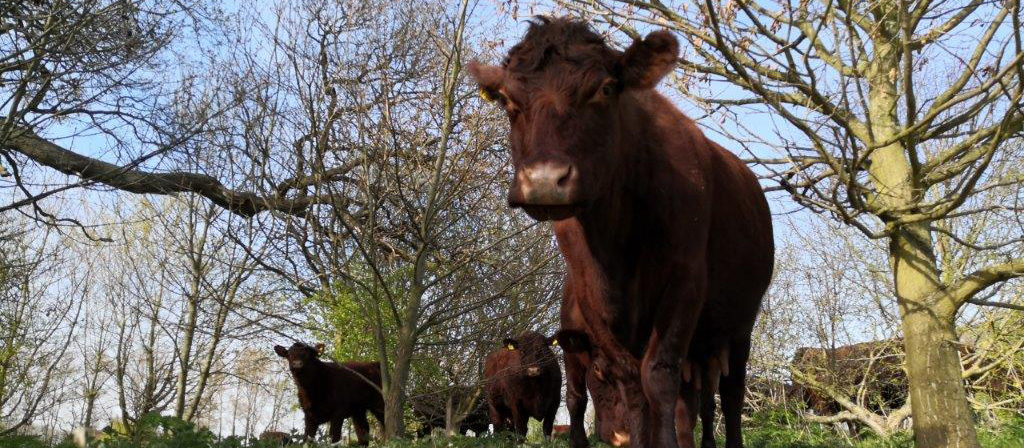New Food Store in Gainsborough
Lincolnshire Co-op has opened its a food store in Gainsborough today, bringing a range of valued services to the local are...
Read MoreOn the day that the United Nations launches its #GenerationRestoration Decade on Ecosystem Restoration campaign (5th June 2021), Doddington Hall, near Lincoln, is revealing its plans for ‘Wilder Doddington’, a long-term project that will see ecosystem recovery across the entire 770ha estate.
The UN Decade is a rallying call for the protection and revival of ecosystems to benefit people and nature. And Wilder Doddington is setting out to regenerate the land by ‘letting nature recover, letting people connect to nature’.
Wilder Doddington is a 100-year project to encourage natural processes to operate at a large scale, and it will result in the development of wood pasture, wetland and species-rich grassland across the previously extensively drained and conventionally farmed arable estate.
Low-intensity grazing and browsing of Lincoln Red cattle, and the existing wild deer population will be the main management and habitat creation tool, with wild ponies and pigs to be added to the mix in due course.
The result will be that woodlands and other habitats expand and connect, and new habitats are created, producing a huge increase in wildlife and biodiversity; a big reduction in greenhouse gases emitted; lots more carbon locked away in soils and vegetation; better and more resilient soils, better water quality; and reduced flooding, as well as sustainable, organic, pasture fed beef.
Wilder Doddington will also be offering a range of wildlife safaris, tours, guided walks and nature spotting; there will be camping, glamping and self-catering accommodation; new walking and cycling routes; access to Wilder Doddington for education and learning, health, fitness and nature-inspired creative and cultural events; and there will be exciting work experience and employment opportunities.

Professor Libby John, Pro Vice Chancellor of University of Lincoln said:
“The University of Lincoln is working with Wilder Doddington to expand the academic outreach and generate research outputs from the project so that the knowledge gained can be published, shared and provide even wider benefits.
We anticipate that the partnership will produce a regular pipeline of popular opportunities for our students and staff. We would like to see Doddington and Lincoln recognised as a centre of excellence in meeting the demand for future agro-ecological academics, professionals and practitioners, who will be critical for the success and broad adoption of nature-based solutions.”
Paul Learoyd, Chief Executive, Lincolnshire Wildlife Trust, said:
“We are excited by the ambition of Wilder Doddington and believe that this landscape scale aspiration has the potential to deliver biodiversity gain of regional significance and to reverse habitat and species losses in the area. Its location close to other important wildlife sites such as Whisby Nature Park, Skellingthorpe Old Wood, Hartsholme and Swanholme SSSI offer great prospects for improving connectivity between sites.”
Claire Birch, partner of Doddington Farms said:
“I spent my 20s worrying about tropical rainforests, but now I realise that landowners in England can play a big part in addressing climate change and biodiversity decline, and we want to be an exemplar of that. It isn’t just about the large area of land that we are devoting to nature recovery, it is also about all the wonderful people who visit Doddington who can also be part of this journey and hopefully be inspired by it to play their own part in combating the most important issues of our time.”
A Natural England spokesperson said:
“Wilder Doddington is receiving support from Natural England and funding through the Higher Tier Countryside Stewardship Scheme. This is currently the largest rewilding project in the East Midlands and will deliver nature recovery at a landscape scale by creating new wildlife habitats. The project will contribute to Defra’s ambition for a new Nature Recovery Network to create bigger, better and more connected areas of wildlife rich areas benefitting nature and people.”

Outcomes of the project
Biodiversity – On the estate there is a mosaic of long-protected, natural features and ecosystems including sites of special scientific interest; ancient woodlands and copses; lowland heath; wetlands and ponds throughout the estate. These will be extended and linked through natural regeneration, the activities of grazing livestock, and the reinstatement of rivers and ponds.
Carbon sequestration and reduced emissions – The re-wetting of the land and conversion from arable to wood pasture and the resulting natural regeneration will result in increased sequestration of carbon in soil trees and vegetation, and a reduction in emissions from arable activity.
Improved flood mitigation and improved water quality – The change in land-use will reduce soil erosion and agro-chemical run-off, and blocking drains and ditches will slow water flows through the land and reduce flood risk downstream in Lincoln.
Nature-based tourism – The estate will offer wildlife and special interest tours; camping, glamping and eco-lodges; cycle routes and hire; cycling, riding and walking.
Improved access to nature / mental and physical wellbeing / cultural and creative activities inspired by nature – Covid has demonstrated the value of access to green spaces for mental and physical wellbeing. In 2019 Lincolnshire had the second lowest access to ‘outdoors’, and there are low rates of physical activity. There are already park runs, cycling ride-outs, walking, volunteering and other outdoor activities hosted at Doddington. The project will develop new routes for cyclists, walkers, runners and link existing routes; work to break down the barriers (physical and psychological) that hold back access (transport, signage, interpretation, outreach, communications). It will also build partnerships with CCGs and voluntary groups working in social and green prescribing.
Employment, training, academic and volunteering opportunities – The new Environment and Agriculture Bills and the prospect of large-scale private sector and institutional funding into the environmental land-use sector is already beginning to create huge demand for ecologists and people with agri-environmental training. The project is already working in partnership with the University of Lincoln, the Greater Lincolnshire Nature Partnership and the Lincolnshire Wildlife Trust, and there are already several undergraduate and post graduate students gaining valuable academic and work experience on the baselining and monitoring of the existing habitats, soil health, water quality and biodiversity. Wilder Doddington will build on all these partnerships and develop learning catering to the needs of academics, post-graduate, undergraduate, college and school students; people excluded from school; people with special needs school; families, local residents, life-long learners, and visitors to the area. There will be employment, training and work experience opportunities across every strand of activity.
To find out more about Wilder Doddington, visit: https://www.doddingtonhall.com/wilder/.
Lincolnshire Co-op has opened its a food store in Gainsborough today, bringing a range of valued services to the local are...
Read MoreThe Great British Food Awards celebrate the country's finest home-grown ingredients and artisanal produce, as well as the har...
Read MoreLog into your account
